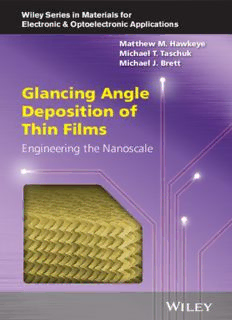
Glancing Angle Deposition of Thin Films: Engineering the Nanoscale PDF
Preview Glancing Angle Deposition of Thin Films: Engineering the Nanoscale
Wiley Series in Materials for Electronic & Optoelectronic Applications Matthew M. Hawkeye Michael T. Taschuk Michael J. Brett Glancing Angle Deposition of Thin Films Engineering the Nanoscale Glancing Angle Deposition of Thin Films WileySeriesinMaterials forElectronicandOptoelectronic Applications www.wiley.com/go/meoa SeriesEditors ProfessorArthurWilloughby,UniversityofSouthampton,Southampton,UK DrPeterCapper,SELEXGalileoInfraredLtd,Southampton,UK ProfessorSafaKasap,UniversityofSaskatchewan,Saskatoon,Canada PublishedTitles BulkCrystalGrowthofElectronic,OpticalandOptoelectronicMaterials,Editedby P.Capper PropertiesofGroup-IV,III–VandII–VISemiconductors,S.Adachi ChargeTransportinDisorderedSolidswithApplicationsinElectronics,Editedby S.Baranovski OpticalPropertiesofCondensedMatterandApplications,EditedbyJ.Singh ThinFilmSolarCells:Fabrication,CharacterizationandApplications,Editedby J.PoortmansandV.Arkhipov DielectricFilmsforAdvancedMicroelectronics,EditedbyM.R.Baklanov,M.Green andK.Maex LiquidPhaseEpitaxyofElectronic,OpticalandOptoelectronicMaterials,Editedby P.CapperandM.Mauk MolecularElectronics:FromPrinciplestoPractice,M.Petty CVDDiamondforElectronicDevicesandSensors,EditedbyR.S.Sussmann PropertiesofSemiconductorAlloys:Group-IV,III–VandII–VISemiconductors,S.Adachi MercuryCadmiumTelluride,EditedbyP.CapperandJ.Garland ZincOxideMaterialsforElectronicandOptoelectronicDeviceApplications,Editedby C.Litton,D.C.ReynoldsandT.C.Collins Lead-FreeSolders:MaterialsReliabilityforElectronics,EditedbyK.N.Subramanian SiliconPhotonics:FundamentalsandDevices,M.JamalDeenandP.K.Basu NanostructuredandSubwavelengthWaveguides:FundamentalsandApplications, M.Skorobogatiy PhotovoltaicMaterials:FromCrystallineSilicontoThird-GenerationApproaches, EditedbyG.ConibeerandA.Willoughby Glancing Angle Deposition of Thin Films Engineering the Nanoscale Matthew M. Hawkeye DepartmentofElectricalandComputerEngineering UniversityofAlberta Canada Michael T. Taschuk DepartmentofElectricalandComputerEngineering UniversityofAlberta Canada Michael J. Brett DepartmentofElectricalandComputerEngineering UniversityofAlberta Canada NRCNationalInstituteforNanotechnology Canada Thiseditionfirstpublished2014 ©2014JohnWiley&Sons,Ltd Registeredoffice JohnWiley&SonsLtd,TheAtrium,SouthernGate,Chichester,WestSussex,PO198SQ,UnitedKingdom Fordetailsofourglobaleditorialoffices,forcustomerservicesandforinformationabouthowtoapplyfor permissiontoreusethecopyrightmaterialinthisbookpleaseseeourwebsiteatwww.wiley.com. Therightoftheauthortobeidentifiedastheauthorofthisworkhasbeenassertedinaccordancewiththe Copyright,DesignsandPatentsAct1988. Allrightsreserved.Nopartofthispublicationmaybereproduced,storedinaretrievalsystem,ortransmitted,in anyformorbyanymeans,electronic,mechanical,photocopying,recordingorotherwise,exceptaspermittedby theUKCopyright,DesignsandPatentsAct1988,withoutthepriorpermissionofthepublisher. Wileyalsopublishesitsbooksinavarietyofelectronicformats.Somecontentthatappearsinprintmaynotbe availableinelectronicbooks. Designationsusedbycompaniestodistinguishtheirproductsareoftenclaimedastrademarks.Allbrandnames andproductnamesusedinthisbookaretradenames,servicemarks,trademarksorregisteredtrademarksoftheir respectiveowners.Thepublisherisnotassociatedwithanyproductorvendormentionedinthisbook. LimitofLiability/DisclaimerofWarranty:Whilethepublisherandauthorhaveusedtheirbesteffortsinpreparing thisbook,theymakenorepresentationsorwarrantieswithrespecttotheaccuracyorcompletenessofthecontents ofthisbookandspecificallydisclaimanyimpliedwarrantiesofmerchantabilityorfitnessforaparticularpurpose. Itissoldontheunderstandingthatthepublisherisnotengagedinrenderingprofessionalservicesandneitherthe publishernortheauthorshallbeliablefordamagesarisingherefrom.Ifprofessionaladviceorotherexpert assistanceisrequired,theservicesofacompetentprofessionalshouldbesought. Theadviceandstrategiescontainedhereinmaynotbesuitableforeverysituation.Inviewofongoingresearch, equipmentmodifications,changesingovernmentalregulations,andtheconstantflowofinformationrelatingtothe useofexperimentalreagents,equipment,anddevices,thereaderisurgedtoreviewandevaluatetheinformation providedinthepackageinsertorinstructionsforeachchemical,pieceofequipment,reagent,ordevicefor,among otherthings,anychangesintheinstructionsorindicationofusageandforaddedwarningsandprecautions.The factthatanorganizationorWebsiteisreferredtointhisworkasacitationand/orapotentialsourceoffurther informationdoesnotmeanthattheauthororthepublisherendorsestheinformationtheorganizationorWebsite mayprovideorrecommendationsitmaymake.Further,readersshouldbeawarethatInternetWebsiteslistedin thisworkmayhavechangedordisappearedbetweenwhenthisworkwaswrittenandwhenitisread.Nowarranty maybecreatedorextendedbyanypromotionalstatementsforthiswork.Neitherthepublishernortheauthorshall beliableforanydamagesarisingherefrom. LibraryofCongressCataloging-in-PublicationData Hawkeye,MatthewM. Glancingangledepositionofthinfilms:engineeringthenanoscale/MatthewM.Hawkeye,MichaelT. Taschuk,MichaelJ.Brett,NRCNationalInstituteforNanotechnology. pagescm Includesbibliographicalreferencesandindex. ISBN978-1-118-84756-5(cloth) 1.Nanotechnology. 2.Chemicalvapordeposition. 3.Nanoelectromechanicalsystems–Designand construction. I.Taschuk,MichaelT. II.Brett,MichaelJ. III.Title. T174.7.H392014 621.3815′2–dc23 2014013307 AcataloguerecordforthisbookisavailablefromtheBritishLibrary. ISBN:9781118847565 Setin10/12ptTimesbyAptaraInc.,NewDelhi,India 1 2014 Contents SeriesPreface xi Preface xiii 1 Introduction:GlancingAngleDepositionTechnology 1 1.1 Nanoscaleengineeringandglancingangledeposition 1 1.2 GLAD-vantages 4 1.2.1 Nanoscalemorphologycontrol 4 1.2.2 Broadmaterialcompatibility 6 1.2.3 Novelthin-filmmaterialproperties 10 1.2.4 Compatibilitywithstandardmicrofabricationprocesses 10 1.2.5 Scalablefabricationmethod 11 1.3 Therootsofglancingangledeposition:obliquedeposition 12 1.4 Theimportanceofexperimentalcalibration 13 1.5 Computersimulationsofglancingangledepositiongrowth 15 1.6 Majorapplicationareasinglancingangledepositiontechnology 17 1.6.1 Energyandcatalysis 17 1.6.2 Sensingapplications 19 1.6.3 Optics 20 1.7 Summaryandoutlineofthebook 21 References 22 2 EngineeringFilmMicrostructurewithGlancingAngleDeposition 31 2.1 Introduction 31 2.2 Basicsofconventionalfilmgrowth 32 2.2.1 Physicalvapourdeposition 32 2.2.2 Nucleationandcoalescence 33 2.2.3 Columnmicrostructure 35 2.3 Glancingangledepositiontechnology:microstructuralcontrolvia substratemotion 37 2.4 Engineeringfilmmorphologywith𝛼 41 2.4.1 Controllingmicrostructureandporosity 41 2.4.2 Directionalcolumngrowth:columntilt𝛽 44 2.5 Engineeringfilmmorphology:columnsteeringvia𝜑rotation 47 2.5.1 Controllingcolumnarchitecturewith𝜑:helicalcolumns 47 2.5.2 Controllingmicrostructurewithrotationspeed:verticalcolumns 48 2.5.3 Continuousversusdiscretesubstraterotation 49 vi CONTENTS 2.6 Growthcharacteristicsofglancingangledepositiontechnologyfilms 53 2.6.1 Evolutionarycolumngrowth 53 2.6.2 Columnbroadening 56 2.6.3 Columnbifurcation 57 2.6.4 Anisotropicshadowingandcolumnfanning 59 2.7 Advancedcolumnsteeringalgorithms 60 2.7.1 𝛽 variationsinzigzagmicrostructures 61 2.7.2 Spin–pause/two-phasesubstraterotation:decoupling𝛽 andfilm density 63 2.7.3 Phisweepmotion:competition-resilientstructuregrowth 67 2.8 Additionalcontroloverfilmgrowthandstructure 72 2.8.1 High-temperatureglancingangledepositiongrowth 72 2.8.2 Multimaterialstructures:co-depositionprocesses 75 References 77 3 CreatingHigh-UniformityNanostructureArrays 81 3.1 Introduction 81 3.2 Seedlayerdesign 82 3.2.1 Seedspacingandseedheight 84 3.2.2 Seedlatticegeometry 86 3.2.3 Seedsize 87 3.2.4 Planarfillfraction 89 3.2.5 Seedshape 90 3.2.6 Two-dimensionalshadowcoverage 91 3.2.7 Seedmaterial 94 3.2.8 Designparametersummary 95 3.3 Seedfabrication 95 3.3.1 Conventionaltechniques 96 3.3.2 Unconventionaltechniques 97 3.4 Advancedcontroloflocalshadowingenvironment 99 3.4.1 Preventingbifurcation:slow-cornermotion 99 3.4.2 Preventingbroadening:phisweepandsubstrateswing 102 References 108 4 PropertiesandCharacterizationMethods 113 4.1 Introduction 113 4.2 Structuralanalysiswithelectronmicroscopy 113 4.2.1 Practicalaspects 114 4.2.2 Scanningelectronmicroscopeimageanalysis 117 4.2.3 Three-dimensionalcolumnimaging:tomographicsectioning 122 4.2.4 Characterizinginternalcolumnstructurewithtransmissionelectron microscopeimaging 124 4.3 Structuralpropertiesofglancingangledepositionfilms 126 4.3.1 Filmsurfaceroughnessandevolution 126 4.3.2 Columnbroadening 128 4.3.3 Intercolumnspacingandcolumndensity 133 CONTENTS vii 4.4 Filmdensity 134 4.4.1 Controllingdensitywith𝛼:theoreticalmodels 135 4.4.2 Experimentalmeasurementandcontroloffilmdensity 136 4.5 Porosimetryandsurfaceareadetermination 140 4.5.1 Surfaceareaenhancementinglancingangledepositionfilms 141 4.5.2 Theporestructureofglancingangledepositionfilms 144 4.6 Crystallographictextureandevolution 146 4.7 Electricalproperties 148 4.7.1 Resistivityinmicrostructuredglancingangledepositionfilms 148 4.7.2 Anisotropicresistivity 151 4.7.3 Modellingglancingangledepositionfilmresistivity 153 4.7.4 Individualnanocolumnproperties 154 4.8 Mechanicalproperties 155 4.8.1 𝛼effectsonfilmstress 155 4.8.2 Hardnessproperties 158 4.8.3 Elasticbehaviourofglancingangledepositionfilms 159 4.8.4 Additionalmechanicalproperties 163 References 164 5 GlancingAngleDepositionOpticalFilms 173 5.1 Introduction 173 5.2 Theopticsofstructuredglancingangledepositionfilms 173 5.2.1 Opticalanisotropyincolumnarglancingangledepositionfilms 173 5.2.2 Modellingglancingangledepositionfilmswitheffectivemedium theory 176 5.2.3 Thecolumnandvoidmaterialrefractiveindices 179 5.2.4 Modellingformbirefringenceviathedepolarizationfactor 180 5.2.5 Dealingwithmicrostructuraluncertainty:boundsontheeffective dielectricfunction 182 5.3 Calibratingopticalpropertiesofglancingangledepositionfilms 182 5.3.1 Basicmeasurements:isotropicapproximations 183 5.3.2 Calibratinganisotropywithpolarization-sensitivemeasurements 185 5.3.3 In-depthcharacterizationwithgeneralizedtechniques 186 5.3.4 Additionalfactors 186 5.4 Controllingglancingangledepositionfilmopticalproperties 187 5.4.1 Basicrefractiveindexengineeringwith𝛼 187 5.4.2 Controllingplanarbirefringencewith𝛼 188 5.4.3 Optimizingbirefringencewithserialbideposition 189 5.4.4 Modulatingbirefringencewithcomplex𝜑motions 192 5.4.5 Controllingnwithadvancedglancingangledepositionmotions 195 5.5 Graded-indexcoatings:designandfabrication 195 5.5.1 Generaldesignmethodforglancingangledepositiongraded-index coatings 196 5.5.2 Designing𝜑motionsforhigh-accuracygraded-indexcoatings 197 5.5.3 Specificexamples 199 5.5.4 Antireflectioncoatings 199 viii CONTENTS 5.5.5 Rugateinterferencefilters 201 5.5.6 Avoidinghigh-𝛼growthinstabilitiesingraded-indexfilms 205 5.6 Designinghelicalstructuresforcircularpolarizationoptics 206 5.6.1 Opticsofchiralglancingangledepositionmedia 206 5.6.2 Engineeringbasichelicalstructures 208 5.6.3 Polygonalhelicalstructures 210 5.6.4 Optimizationofcircularbraggphenomenawithserialbideposition 212 5.6.5 Microcavitydesigninhelicalstructures 213 5.6.6 Fabricatinggraded-birefringencethin-filmdesigns 214 5.7 Practicalinformationandissues 216 5.7.1 Post-depositiontuning 216 5.7.2 Environmentalsensitivity 217 5.7.3 Opticalscattering 217 References 218 6 Post-DepositionProcessingandDeviceIntegration 227 6.1 Introduction 227 6.2 Post-depositionstructuralcontrol 227 6.2.1 Annealing 227 6.2.2 Chemicalcompositioncontrol 231 6.2.3 Microstructuralcontrolviachemicaletching 231 6.2.4 Ion-millingstructuralmodification 233 6.2.5 Columnsurfacemodifications 235 6.3 Depositionontononplanargeometries 236 6.4 Photolithographicpatterningofglancingangledepositionthinfilms 237 6.5 Encapsulationandreplanarizationofglancingangledepositionfilms 240 6.5.1 Encapsulationlayersubstratemotions 240 6.5.2 Filmstressinencapsulationlayers 242 6.6 Integratingelectricalcontactswithglancingangledeposition microstructures 244 6.6.1 Planarelectrodeconfigurations 244 6.6.2 Parallel-plateelectrodeconfigurations 245 6.7 Filmsinliquidenvironments 247 6.8 Usingglancingangledepositionmicrostructuresasreplicationtemplates 251 6.8.1 Single-anddouble-templatefabricationprocesses 251 6.8.2 Nanotubefabricationviatemplatefabrication 252 References 254 7 GlancingAngleDepositionSystemsandHardware 261 7.1 Introduction 261 7.2 Vacuumconditions 261 7.2.1 Vacuumrequirementsforglancingangledepositionsystems 261 7.2.2 Physicalvapourdepositionprocessgasesandhigherpressure deposition 263 7.3 Thicknesscalibrationanddepositionratemonitoring 265 7.3.1 Sourcedirectionalityandtoolingfactor 265 7.3.2 Thicknesscalibrationatnonzero𝛼:depositionratios 267 7.3.3 Extendedsource:effectoncollimation 269
Description: